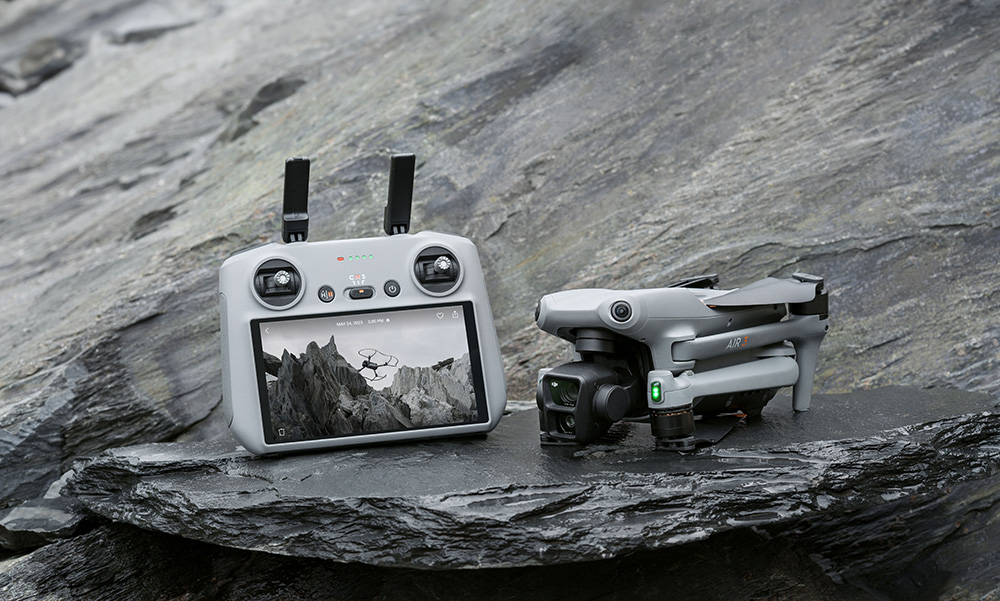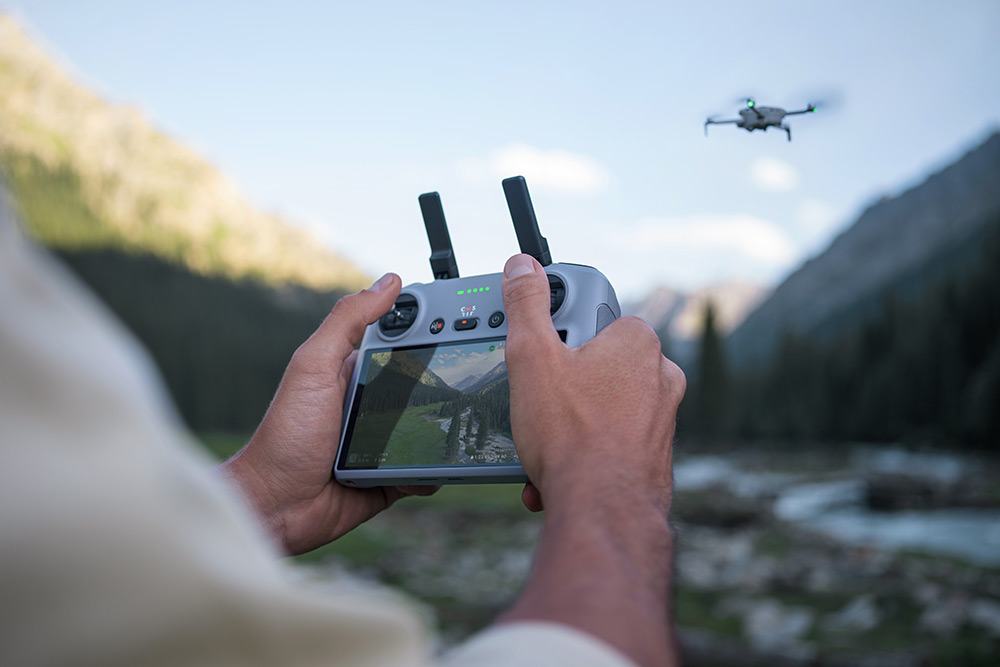- Call us: 01444 237070
- Contact Us
- Stores
- Sign In / Register
-
- Back
- Used Cameras
- Used Accessories
- Used Lenses
- Used Video
- Used Film Equipment
- Used Stock Alert
- Used Blank Test
- Sell or Part Exchange
- Used Clearance
- Recently Added Used Equipment
- Park Picks
- All Used Black Friday Deals
- Faulty
- Trade-In
- Blog
- New in
- Call us
- Contact us
- Stores
- Sign in
- Categories
- Tips & Inspiration
- Reviews
- News
- Events
- Features
- Buying Guides
- Competitions
The Ultimate Guide To DJI Drones
Over the last decade, drones have gone from obscurity to a staple in any photographer or videographer’s kit. They offer new opportunities for dynamic shots and unique perspectives, inspiring content creators, photographers and more.
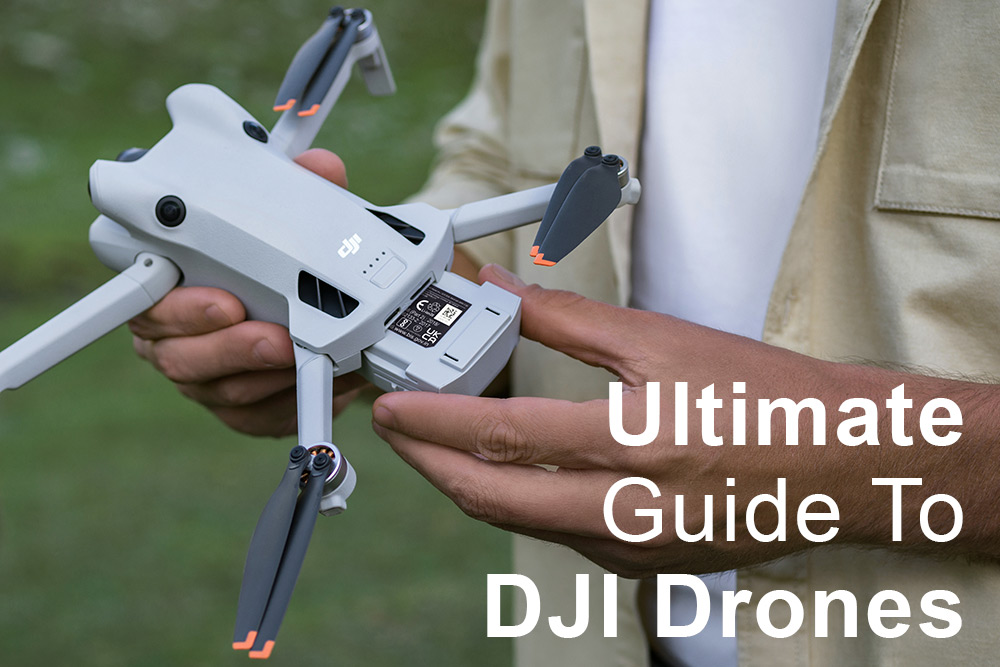
DJI has established itself as the provider of the best drones for beginners and professionals alike – the brand’s product line has gone from strength to strength, becoming a household name. Their range spans five different series, which come with a diverse range of features and specs in order to provide options for all budgets, which can make it hard to choose the model for you and your specific needs.
We’ve put together this DJI drone comparison that covers what to know before you buy, explaining which DJI option is best for your individual needs enabling you to choose the right one for you.
What to consider before buying a DJI drone
Due to the vast array of DJI drones that we stock, you’ll inevitably have to make some considerations to find the best DJI drone for you. DJI offers three main series of consumer camera drones – Mini, Air, and Mavic – with models for anyone regardless of ability, experience and budget.
Each series varies in features like flight time, video quality, sensor sizes and more in order to meet different demands based on each user. The company’s promising catalogue caters to all users; photographers, videographers and even racers, making them a go-to brand for the best drones with camera on the market. This comparison walks you through each series and discusses some of DJI’s other exciting product lines.
If it’s your first time operating a drone, check out our guide that details all you need to know about UK drone flying laws.
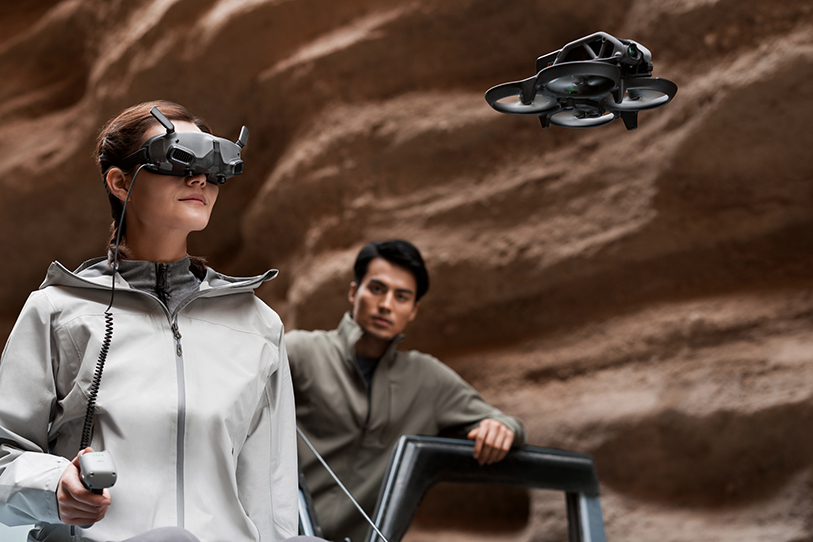
What do I need to start drone racing?
As drones have become more accessible to the public, drone racing has become a novel hobby for photography enthusiasts - thrill-seekers will look to DJI’s first-person-view (FPV) series, which offer everything needed to get started , and the perfect option for any skill level or budget. They can help content creators produce captivating media with super-smooth aerial footage too.
The DJI Avata drone is designed for both agility and robustness. Despite its protective propeller guards, it’s significantly light and compact, making it the perfect choice for a portable FPV experience. The added protection means it can be flown indoors and through tight spaces.
This model supports 4K ultra-wide-angle photography, providing stunning, immersive footage through your goggles. It comes in a variety of combos, namely the Fly Smart, Pro-View and Explorer combos that come with everything you need for the full FPV experience, each containing goggles and a low-latency controller.
The Avata offers 3 control modes, namely Normal, Sport and Manual. Manual mode allows flight at an eye-watering 60mph. Sport mode also offers stabilisation and obstacle avoidance features for beginner pilots, whilst still operating at high speeds, so if you’re looking for a powerful racing drone to get into this exciting hobby, look no further.
The British Drone Racing Association has vital information for anyone looking to get started.
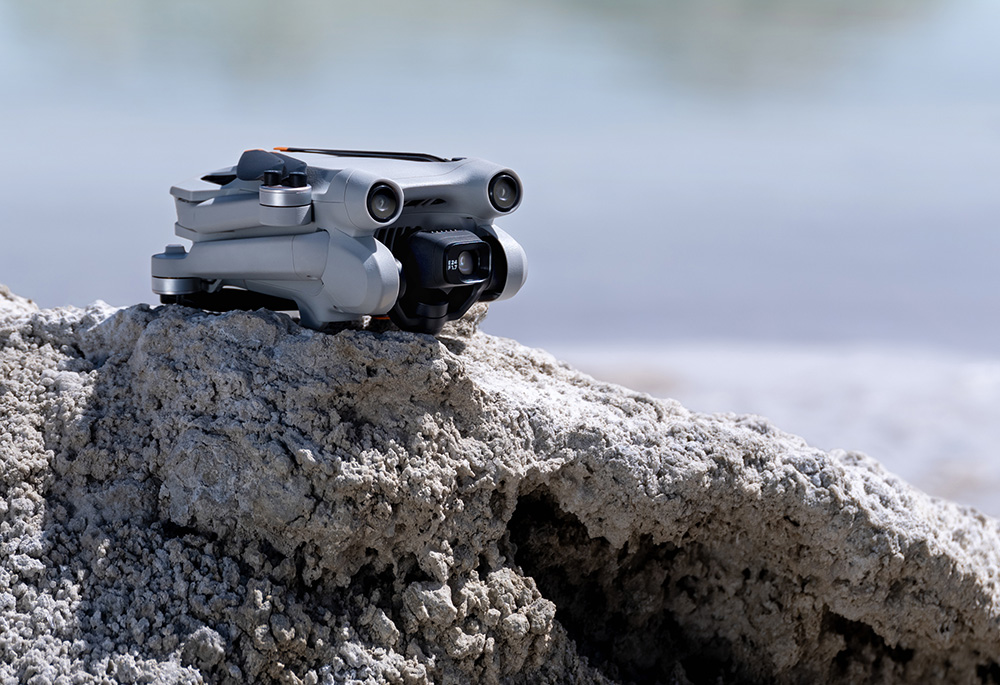
Which is the best drone for beginners?
With drone technology becoming more advanced by the minute, now is a better time than any to start flying. As a beginner, chances are you’ll be looking for a cost-efficient option that’s light and easy to control. DJI Mini is DJI’s mini drone with camera series – however, the name doesn’t do justice to the amount of tech packed into these aircraft.
The Mini series features a host of premium features on a lower budget; keeping light and portable so you can bring them on all of your trips and adventures. Each model weighs less than 250g so you can control them easily and more freely under the drone weight law.
The DJI Mini 2 SE is the cheapest DJI drone, and offers 2.7K video with features like Smart RTH and one tap take-off that make this choice one of the best drones for beginners. The DJI Mini 3 is for those looking to improve their experience whilst keeping a light payload and a lower budget. The system upgrades from the 2 SE with a 48MP camera, more intelligent features like MasterShots and FocusTrack, and improved battery life.
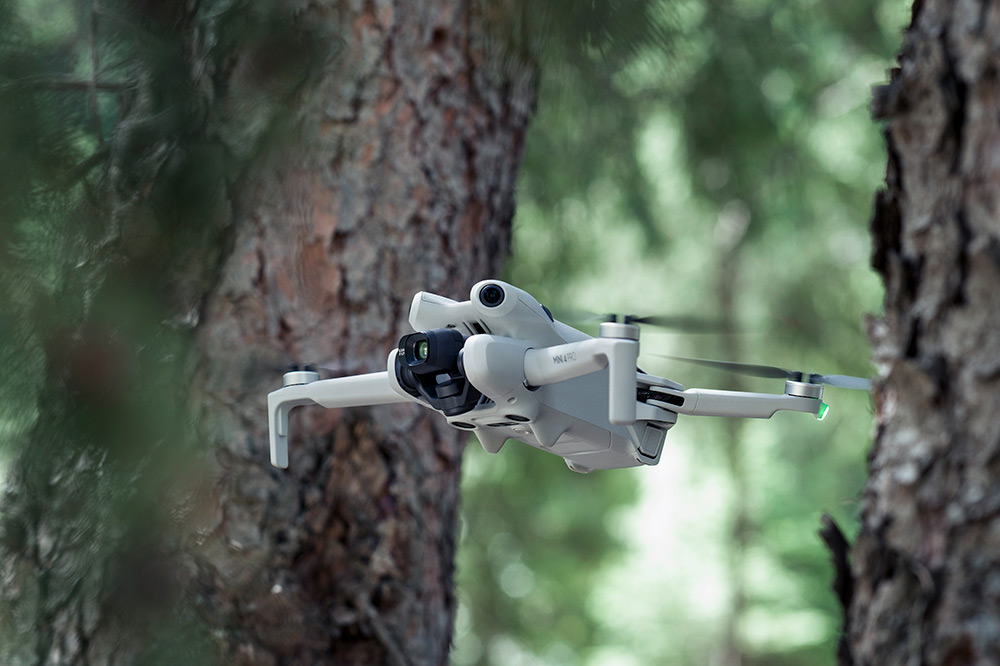
Upgrading to the Mini 4 Pro gives you the greatest freedom with your drone, as it packs in omni-directional sensing systems and a much larger transmission distance so that flying your drone is a breeze. The Mini 4 Pro also enables 4K @ 60fps footage, so even commercial operators can deploy a DJI Mini drone to get the best quality footage. It introduces groundbreaking features to the enthusiast drone market, such as the newly-added Night Shots and ActiveTrack 360 video features, bringing a new level of control and versatility to your aerial footage
Each option can be bought on its own or in a combo – all models come with a Fly More combo that provides additional features like carry bags, extra batteries and more. On each model, users can also pair the DJI drone app for a live view and a better hands-on experience.
|
|
|||
|
Max Flight Time |
34 minutes (with Intelligent Flight Battery) |
38 minutes (with Intelligent Flight Battery) |
31 minutes |
|
Image Sensor |
1/1.3-inch CMOS, 48MP |
1/1.3-inch CMOS, 48MP |
1/2.3-inch CMOS, 12MP |
|
Lens |
24mm equivalent f/1.7 |
24mm equivalent f/1.7 |
24mm equivalent f/2.8 |
|
Image Size |
8064x6048 |
8064×6048 |
4000×3000 |
|
Video Resolution |
4K @ 60fps HDR Slow Motion 4K @ 100fps |
4K @ 30fps 2.7K @ 60fps |
2.7K @ 30fps |
|
Digital Zoom |
4K: 3x
FHD: 4x |
4K: 2x 2.7K: 3x FHD: 4x |
2.7K: 3x FHD: 4x |
|
Sensing Type |
Omnidirectional vision system |
Downward vision system |
Downward vision system |
|
Max Transmission Distance |
20 km |
10km |
10km |
What is the DJI Air series?
DJI’s Air series offers a step up from the Mini series, which combines DJI’s cutting-edge design with advanced technology. The DJI Air 3 offers two different cameras – a wide-angle and a telephoto – for brilliant versatility when building your compositions.
Both the DJI Air 2S and DJI Mavic Air 2 provide professional 4K footage and complete sensing systems that enable clever obstacle avoidance. If you’re looking for strong performance, but the flagship Mavic drones are outside of your budget, this series may be the way to go.
|
|
DJI Mavic Air 2 |
|||
|
Take-off Weight |
720g |
595g |
570g |
|
|
Max Flight Time |
46 minutes |
31 minutes |
34 minutes |
|
|
Image Sensor |
2 x 1/1.3-inch CMOS, 48MP |
1-inch CMOS, 20MP |
1/2-inch CMOS, 48/12MP |
|
|
Lens |
Wide Angle: 24mm equivalent f/1.7
Medium Tele: 70mm equivalent f/2.8 |
22mm equivalent f/2.8 |
24mm equivalent f/2.8 |
|
|
Image Size |
8064×6048 on both cameras |
3:2 5472×3648 16:9: 5472×3078 |
8000×6000 |
|
|
Video Resolution |
4K @ 100fps |
5.4K @ 30fps 4K @ 60fps |
4K @ 60fps |
|
|
Sensing Type |
Omnidirectional vision system Downward infrared sensor |
Forward, backward, upward and downward vision system |
Forward, backward and downward vision system |
|
|
Max Transmission Distance |
20km |
12km |
10km |
|
What’s the difference between 2.7K and 4K drones?
Whether 2.7K or 4K is the best resolution for you usually depends on what you’ll do with your images or footage afterward. In terms of file size, 4K is about 150% sharper than 2.7k, but this means your photos are usually 150% larger. 4K drones produce higher-quality images, which creates more possibilities for making professional edits to your media, and provides new capabilities for content creators.
Using 4K makes colour grading and cropping much more impactful. Sensor size is a good feature to look for, as drone cameras with more megapixels (MP) produce higher quality images – 48MP cameras are capable of 4K footage, while 12MP cameras for example are limited. Models like the Mini 4 Pro come with a 4K drone camera that allows for crisp aerial footage.
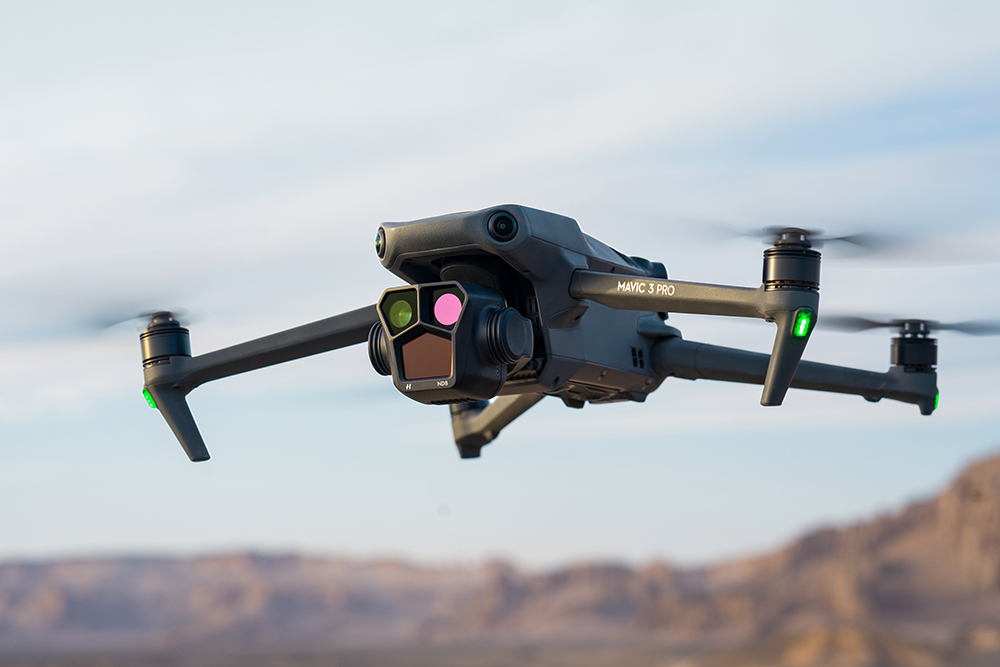
What is the DJI Mavic drone series?
The DJI Mavic series contains the very best consumer drones that DJI has to offer, built with advanced quality and professionals in mind. The DJI Mavic 3 Classic is perfect for those who need to draw out the best possible results - the picture quality from the Hasselblad camera brings excellent colour and dynamic range, fast lens apertures and a 24mm equivalent focal length for stunning wide-angle shots. Videographers will also love the 5.1K HD video and the 46-minute flight time, providing beautifully detailed video and allowing users to film for much longer.
Obstacle Sensing and Return to Home (RTH) capabilities also come as part of the package, helping new and experienced pilots enjoy safe and collision-free flights. If this isn’t enough; upgrading to the Mavic 3 Pro covers all bases with two additional telephoto cameras along with the state-of-the-art Hasselblad, which is possibly the best drone camera on the market. This impressive model provides unparalleled creative opportunities and puts professional aerial cinematography into your own hands.
The Mavic series aircraft are all built for performance and are compatible with the DJI RC Pro controller, which offers an outstanding video feed and efficient control.
DJI Mavic drones are the perfect choice for anyone endeavouring to produce pro-level content - their breath-taking specs mean that they are considered the gold standard in the industry, and arguably the best camera drones on the market.
|
|
||
|
Max Flight Time |
46 minutes |
43 minutes |
|
Image Sensor |
4/3 CMOS, 20MP |
Hasselblad: 4/3 CMOS, 20MP Medium Tele: 1/1.3-inch CMOS, 48MP Tele Camera: 1/2-inch CMOS, 12MP |
|
Lens |
24mm equivalent f/2.8 to f/11 |
Hasselblad: 24mm equivalent f/2.8 – f/11 Medium Tele: 70mm equivalent f/2.8 Tele: 166mm equivalent f/3.4 |
|
Image Size |
5280×3956 |
Hasselblad: 5280×3956 Medium Tele: 8064×6048 Tele Camera: 4000×3000 |
|
Video Resolution |
5.1K @ 50fps 4K @ 120fps Slow Motion HD @ 200fps |
Hasselblad: 5.1K @ 50fps Medium Tele: 4K @ 60fps Tele Camera: 4K @ 60fps |
|
Digital Zoom |
1-3x |
Hasselblad: 1-3x Medium Tele: 3-7x Tele Camera: 7-28x |
|
Sensing Type |
Omnidirectional vision system, with a downward-facing infrared sensor |
Omnidirectional vision system, with a downward-facing infrared sensor |
|
Max Transmission Distance |
15km |
15km |
Is it easy to fly a DJI drone?
DJI, innovative as they are, are constantly implementing new ways to ensure that controlling your drone is simple. Their models have a reputation for being easy to set up and start flying – take-off and landing are automatic, and all their current models have Return to Home functionality that gives ease of mind when you’re finishing up using your drone. This also comes in handy if your battery is low or your signal drops mid-flight, which stops otherwise unavoidable mishaps and keeps your aircraft safe.
The Mavic 3 Pro is by far the best DJI drone for ease of flight, with omnidirectional object sensing, cruise control, advanced RTH and even a programmable Waypoint Flight feature that precisely repeats your chosen routes. Its proprietary QuickShots and MasterShots features automate the shot selection process to provide you with a range of different angles and perspectives.
Explore our range of DJI drones and accessories today – we’re sure that their catalogue will have something for you. You can also discover our full range of drones here, along with many additional accessories to elevate your aerial content.
Share this post:
By Thom Pyle on 06/10/2023
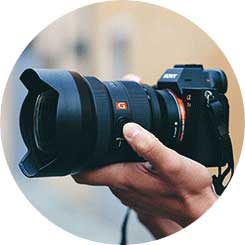
Trade in your old equipment
Fast and easy trade in service ensures your old gear is collected efficiently and you are paid quickly! It's very simple to trade in your unwanted photography gear. Just head over to our dedicated Sell or Part Exchange page, fill out the details, and we'll get back to you with an offer for your old gear. Take the cash, or put it towards the cost of your new gear. It's up to you! Find out more
sign up to the newsletter
Keep up to date on the latest photography news, events and offers. Sign up now

